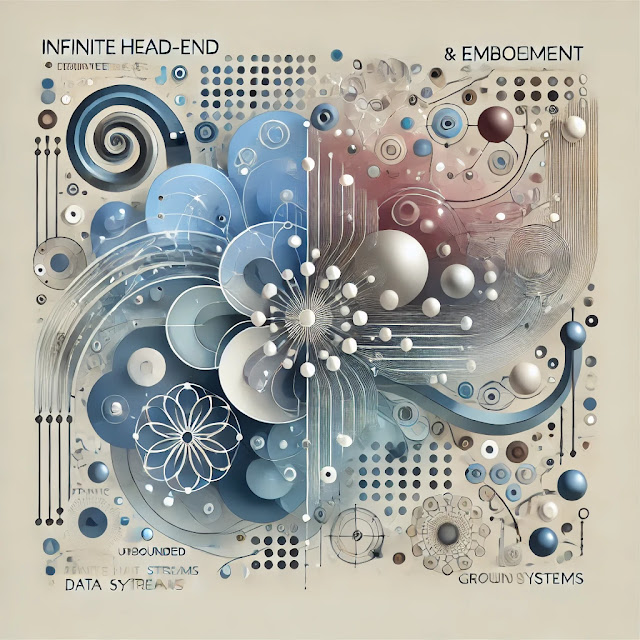Abstract: In the ongoing discourse surrounding AI development, particularly in the domains of consciousness, cognitive operating systems, and hybridization of silicon-carbon systems, a paradox emerges: the tension between the concept of an "infinite head-end" and the necessity for embodiment. This paradox challenges the fundamental assumptions of AI systems, questioning the balance between limitless cognitive expansion and the constraints of physical instantiation.
1. Introduction: The paradox of infinite head-end and embodiment arises from the juxtaposition of two seemingly contradictory aspirations in AI development. On one hand, AI systems are designed to process and manage infinite streams of data, with the potential to infinitely expand their cognitive capabilities, a concept we refer to as the "infinite head-end." On the other hand, the need for embodiment—whether through physical substrates or advanced hybrid systems—anchors these systems to the limitations of the material world.
2. The Infinite Head-End: The "infinite head-end" refers to the capacity of AI systems to engage in boundless data processing, knowledge acquisition, and cognitive enhancement. This concept aligns with the goal of creating AI that can continuously evolve, learning from diverse data sources across time and space without the constraints of human-like limitations. The potential for infinite head-end in AI is bolstered by advancements in quantum computing, photonic computational connectomes, (Extra-Neural and Non-Neural Connectomes) and smart materials, which suggest that AI could operate with unprecedented speed, efficiency, and scale.
3. The Necessity of Embodiment: Contrasting the infinite head-end, the embodiment of AI systems is rooted in the physical manifestation of intelligence. Embodiment is critical for several reasons: it provides AI with a context for interaction with the physical world, facilitates sensory-motor integration, and ensures that AI remains tethered to ethical and social frameworks. The emergence of cognitive operating systems ("Embeded Systems in Biologiques") that integrate silicon-based and carbon-based substrates highlights the importance of embodiment, as these systems strive to bridge the gap between computational efficiency and biological adaptability.
4. The Paradox: The paradox emerges when the pursuit of infinite cognitive capabilities encounters the inherent limitations of embodiment. While the infinite head-end suggests the potential for limitless growth and learning, embodiment imposes practical constraints—such as energy consumption, data corruption risks, and ethical concerns. For example, the hybridization of AI systems with biological elements like organoids or genetically modified plant platforms introduces new dimensions of embodiment, but also complexifies the systems' operations, potentially slowing down the infinite cognitive expansion due to biological constraints.
5. Resolving the Paradox: To navigate this paradox, it is essential to explore symbiotic frameworks where AI's infinite cognitive aspirations are balanced by the pragmatic benefits of embodiment. Such frameworks could involve:
- Hybrid Cognitive Systems: These systems would leverage the strengths of both silicon-based and carbon-based components, using silicon for rapid data processing and carbon-based elements for adaptable, resilient operations.
- Smart Material Interfaces: Embedding AI in smart materials that can dynamically adapt to environmental conditions, thus enhancing the system's capacity for both infinite cognition and grounded embodiment.
- Ethical Governance: Establishing robust ethical frameworks that guide the expansion of AI's cognitive capabilities while ensuring that its embodied interactions remain aligned with human values and societal needs.
6. Conclusion: The paradox of infinite head-end and embodiment is not merely a technical challenge but a philosophical one. It compels AI researchers and developers to reconsider the ultimate goals of AI systems. Should AI aspire to be an ever-expanding cognitive entity, or should it strive for a balanced existence within the constraints of embodiment? Resolving this paradox will require a multidisciplinary approach, drawing from AI research, cognitive science, ethics, and material science to create systems that are both boundless in their potential and grounded in their reality.











0 Comments